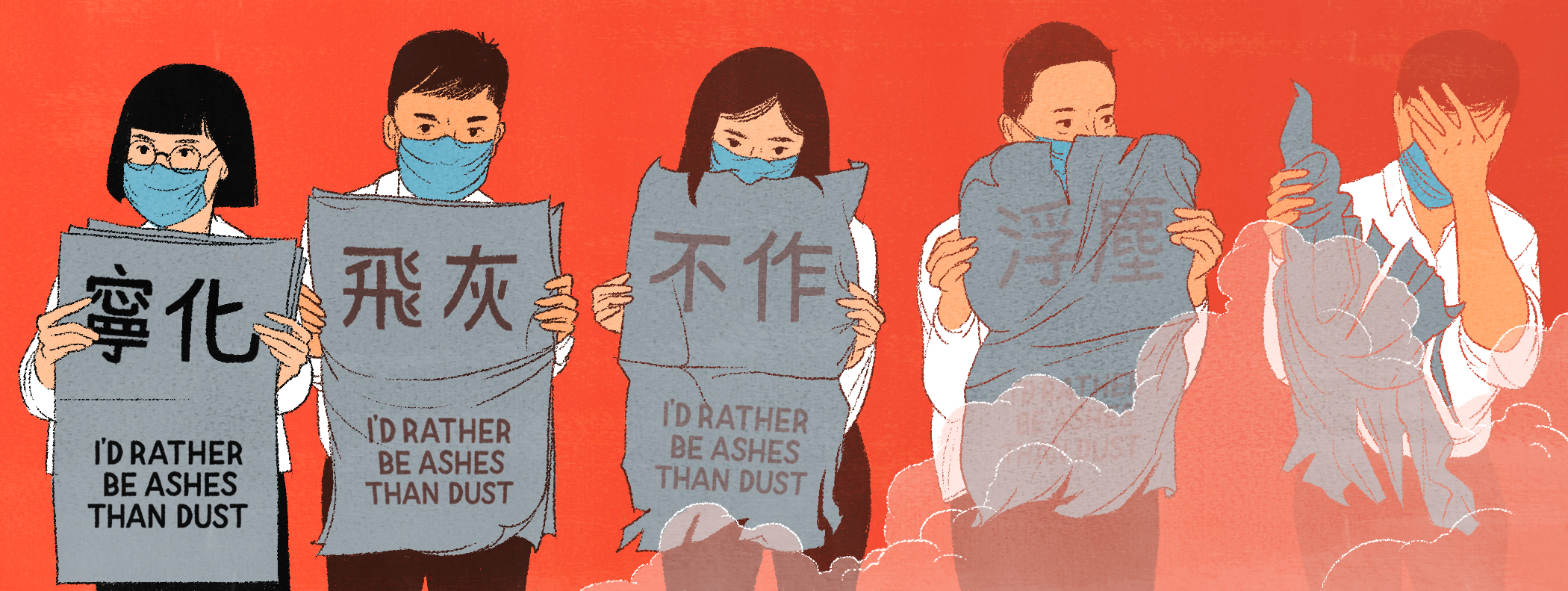In the summer of 2019, Nabela Qoser, a broadcast reporter, became the face of Hong Kong’s adversarial press. The city was in deep political crisis. Anti-Beijing protests numbering in the hundreds of thousands of people had erupted over a government push to allow the extradition of suspected criminals to mainland China. Then, one evening during an unusually hot July, a mob of men dressed in white, bearing metal rods and bamboo poles, attacked a crowd in a train station that included people returning home from the protests. The police, claiming to be busy elsewhere, did not immediately arrest the assailants. At a news conference the next morning, the city watched as Qoser fired rapid questions at Carrie Lam, Hong Kong’s pro-Beijing leader.
“Where were you all night?” Qoser asked, with steely enunciation.
“Could you sleep?”
“Was the violence a show jointly put on by the government, the police, and triads, as the public believes?”
Lam evaded the questions, and Qoser became impatient. “Speak like a human, please!” she interjected. The phrase immediately became an internet meme and fodder for political satire. To many, Qoser was the personification of the Fourth Estate, holding power to account.
Hong Kong has long had a boisterous press culture. In a place without democracy but with constitutional guarantees of free speech and a free press, the media spoke loudly about injustice, abuse, and scandal. From the Tiananmen massacre in 1989 to the Umbrella Movement twenty-five years later to the contentious and sometimes violent anti-government protests of 2019, news outlets in Hong Kong have had far more freedom than their counterparts in mainland China to report on regional politics and democratic developments.
But Beijing has since run out of patience. In a speech delivered in June 2020, a Chinese official gave rare insight into the government’s thinking: he blamed negative media coverage of China, loopholes in national security, and a lack of patriotic education as the foremost reasons that society had become “highly politicized and populist.” The speech foreshadowed tougher treatment of the press.
Weeks later, in a move to quash dissent online and in the streets, Beijing imposed national security legislation on Hong Kong. The law is being applied broadly, to eliminate opposition. In late February, the police detained forty-seven democracy advocates—the bulk of Hong Kong’s active opposition figures—on charges of “conspiracy to commit subversion.” Beijing is now expected to drastically overhaul Hong Kong’s political system to purge democracy activists and those deemed disloyal from public office. Government, education, and media, a top official said, “have yet to really form a stable situation of ‘patriots ruling Hong Kong.’ ”
The climate has grown chilly. The New York Times has moved parts of its Asian operations from Hong Kong to Seoul, citing visa delays and uncertainty about the city’s prospects. After enduring months of tear gas, rubber bullets, and water cannons, journalists have new concerns: raids, search warrants, and arrest. Earlier this year, Qoser’s employer, Radio Television Hong Kong, a government-funded network, placed her on a short 120-day contract, a move interpreted as an effective termination—retaliation for her tough questioning of officials. Then, in February, the government installed a career bureaucrat with no journalism experience as the top boss at RTHK, demanding stronger editorial oversight. The head of Qoser’s section, as well as two executive producers, have resigned.
This is just what has happened in the public view. On the inside, too, the press culture is changing. Conversations with more than two dozen journalists in Hong Kong showed that reporters are becoming more cautious, at times giving in to self-censorship. They sense a new fidelity to “both-sides-ism” from their managers. Other journalists remain defiant, at professional and personal cost. Friends in the media joke about sharing a cell with one another. A look at the past eight months shows a systematic push from Beijing-backed authorities to tame Hong Kong’s press. This might be just the beginning.
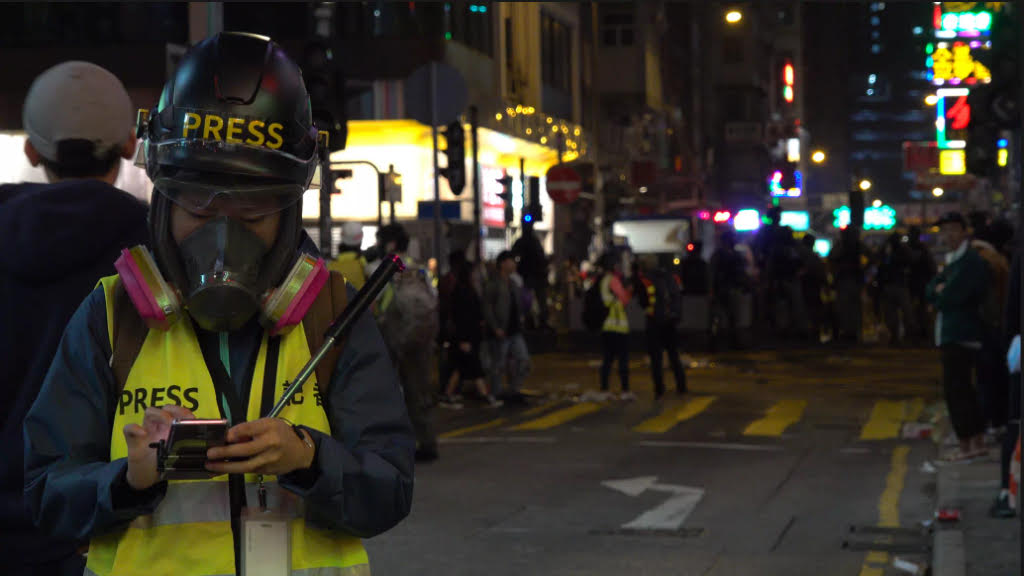
Leung Ka-lai files a story during a protest in the Mong Kok neighborhood in the early hours of New Year’s Day in 2020. Photo credit: Ma Chi Hang
Leung Ka-lai, Apple Daily – June 30, 2020
As midnight approached, Leung Ka-lai’s phone started to blink. A group chat she was in with her coworkers at Apple Daily, Hong Kong’s largest pro-democracy newspaper, was blowing up. Earlier in the day, Beijing’s top lawmakers had passed secretive new security legislation for Hong Kong, and its contents had just been revealed. Everyone was trying to make sense of a new reality. “We’ve done so many stories. Are we going to be in trouble?” one colleague messaged. “There’s no use being scared. We still have to keep doing this,” another wrote.
The new law’s language was vague, but its punitive nature was unmistakable. It decreed that authorities would bolster their “supervision” of the media and the internet over national security matters, and would “strengthen the management of and services for” foreign newsrooms in the territory. To Leung and her colleagues, it remained unclear whether news publishing could constitute a crime of “incitement” or provoking “hatred” toward the government. Perhaps their answer was buried at the bottom of the 10,000-word document; the power of interpreting the law rested with Beijing’s top lawmaking body. Maybe that’s why the law didn’t spell everything out, Leung thought. She went to bed feeling more confused than worried.
The next morning, July 1—the twenty-third anniversary of Hong Kong’s handover from British to Chinese rule—Leung went out to report in Causeway Bay, a crowded commercial district where protesters assemble every year for pro-democracy marches. Typically these marches are tame, family-friendly events, and Leung would have been asking questions like “Why are you bringing your kid to the march?” This year’s rally, though, had been banned by the police, so Leung spent her time interviewing black-bloc protesters, who favor more confrontational protest tactics: “Why did you come out? Are you afraid of the national security law?” Despite the heavy police presence, thousands of people had gathered to chant slogans, some waving pro-independence flags.
Later that day, Leung filed a story headlined “A Different July 1: When Protests Are Prohibited.” To protect its reporters from potential reprisal under the new security law, Apple Daily had removed all bylines at the time—but not for feature writers like Leung. Suddenly her name, on the most potentially sensitive story of the moment, was the only one visible on the following day’s paper.
“I felt a flash of horror,” Leung says. But she checked her fear. “I was just adhering to what I’ve always done and keeping up that professional standard. Why would I have any qualms about my work?”
‘You can’t chop off your toes to avoid the sand bugs,’ Leung says, invoking a Cantonese proverb. ‘There’s no way of knowing where the red line is.’
Leung, thirty-nine, had been a reporter for nearly fifteen years, mostly for pro-government or moderate publications. Her former managers were reluctant to publish stories sympathetic to the democracy movement, or sometimes gave direct orders against running such stories. This had always troubled her, but the 2019 protests sharpened her sense of mission as a journalist. Those marches were some of the largest ever seen in the city; reactions to the government’s extradition bill grew into wider calls for democracy and police accountability, and street battles between protesters and riot officers escalated to dangerous proportions. “Compared to when I was younger, it was during the anti-extradition protests that I felt more fired up,” Leung says.
After the security law took effect, several of Leung’s sources dropped scheduled interviews. Leung said she used to have a success rate of 70 percent in getting people to talk to her, but now less than a quarter of them do. Her goal is to hold on to that quarter.
“You can’t chop off your toes to avoid the sand bugs,” Leung says, invoking a Cantonese proverb. “There’s no way of knowing where the red line is, but you either keep doing the work in line with the values you’ve always believed in, or you leave the industry. You can’t say, I’ll retreat a little and not write this word or not pursue this subject. It’s all or nothing.”
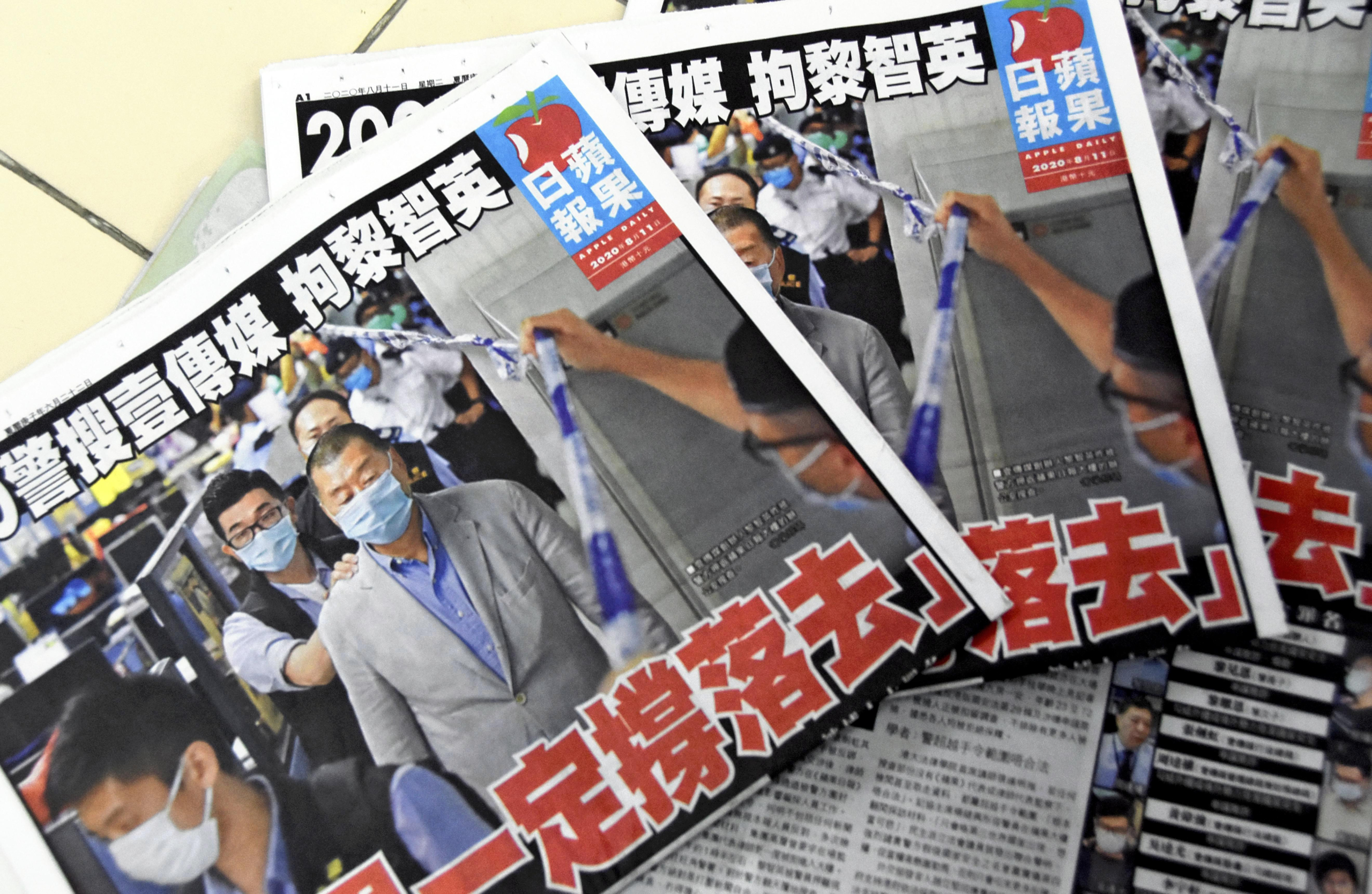
The arrest of Jimmy Lai as reported in Apple Daily. Photo credit: The Yomiuri Shimbun via AP Images
Icy Chung, Apple Daily – August 10, 2020
Icy Chung, a colleague of Leung’s at Apple Daily, woke up on a muggy summer morning to the news of her boss’s arrest. Jimmy Lai, a refugee turned multimillionaire who founded Apple Daily in 1995, had in the past two decades emerged as a prominent critic of Beijing—a rare position among Hong Kong’s moneyed elite. The plucky tabloid runs breaking news, investigations, celebrity gossip, and cheekily narrated political videos.
Over the preceding months, Lai had been arrested on several occasions, but this time looked to be more serious. Chung, watching in shock from home, followed a livestream on a colleague’s camera. The video showed an army of police officers moving methodically through Apple Daily’s five-story headquarters. Several officers wearing black gloves riffled through documents on journalists’ desks while the editor in chief tried in vain to stop them.
Chung, a reporter, had been working from home like the rest of the staff, but she was soon called in to the office to help cover the raid. When she arrived, the police took her personal information without explanation, including her employee details, phone number, and home address. Still, she pressed on. A supervisor asked her to film a livestream on the fourth floor, which the police had completely fenced off. She was forced to register again with the officers just to get water from a vending machine. “They wanted to intimidate me,” she says.
Lai had been arrested at his home after sunrise. Shortly before 11am, Chung watched him being escorted into the newsroom, handcuffed, by dozens of officers. When he went to the bathroom, more than fifty officers followed him, blocking off the area. Lai was already facing charges in court for his protest activities, but the police arrested him that day under the new security law. They also arrested four Apple Daily executives and Lai’s two sons, who are not part of his media ventures. (In December, Lai was formally charged with collusion with foreign forces and immediately remanded into custody, where he remains. The police cited his calls for sanctions against Beijing officials, his articles and interviews for Western media, and his Twitter activity—he followed foreign politicians’ accounts and tagged Donald Trump—as part of their evidence. They also cited an opinion article Lai wrote last May for the New York Times, titled, “Do My Tweets Really Threaten China’s National Security?”)
The scene in the Apple Daily office would have been unimaginable to Chung when she was a high school student eagerly reading a weekly magazine owned by Apple Daily’s parent company. She loved the profiles it published, especially of Albert Leung, a Cantopop lyricist whose poetic and tender lines many Hong Kongers know by heart. She regularly tore out pages from the weekly to save, and later went on to journalism school.
A few years into her career, during the pro-democracy Umbrella Movement of 2014, Chung found herself working for a government-friendly paper that she felt took too narrow a stance against civil disobedience. She wanted to write for publications that shared her values and accommodated a “plurality of voices” to allow readers to make their own judgments. She joined Apple Daily months after those rallies. But by the 2019 protests, she observed, the media’s polarization had become more severe; readers who only followed pro-Beijing news outlets would never encounter reports of the movement that didn’t fit a preconceived narrative: for example, that the protesters were all violent rioters. Meanwhile, she worried that pro-democracy outlets were less and less able to carry out sensitive reporting. In February 2020, Apple Daily obtained a report submitted by Lam to China’s central government that cast the pandemic as an opportunity to help Lam’s pro-Beijing camp make political gains. Now a story uncovering such closely guarded correspondence with Beijing’s leadership could invite retaliation under the security law, Chung says.
Chung was seeing with her own eyes that a crackdown had begun. She was angry at the sight of her bosses being forced to take a perp walk across their own newsroom. “Squelching the key figures of the company means squelching our entire publication. They want to use all kinds of ways to force us to submit,” Chung says. She was most irate when she saw the officers poking through reporters’ desks and flipping through their notes—journalistic materials were outside the scope of the search warrant authorities had delivered. Those gestures, Chung says, felt “wanton and disrespectful.”
Chung’s prognosis for the future of journalism in her city is gloomy, but she intends to stick with Apple Daily until the end. “I’ll work another day for as long as I can,” she says.
Tiffanie Leung, Stand News – September 22, 2020
Tiffanie Leung, twenty-four, started her career in an environment that was becoming increasingly authoritarian. She took her first full-time job at Stand News, a popular pro-democracy news site similar to HuffPost, in June. A cultural studies graduate with a minor in journalism, she wanted to understand the people who joined the 2019 protests and to tell better stories about them. Leung has easily built sources within the movement, since many protesters are of her generation. But being young isn’t always an advantage.
At protests, young journalists are frequent targets of the police because they are close in age to many student protesters, or are students themselves. Some of the most consequential footage from the recent protests, showing police shootings and other abuses, was captured by nontraditional online outlets or students reporting for democratic-leaning campus publications. On September 22, the police took aim at these non-mainstream media sources.
In a letter, Kenneth Kwok, a senior official with the Hong Kong Police Force’s public relations branch, informed press associations that the police would recognize reporters only from government-registered outlets and from internationally known and “reputable” foreign publications. In rules rewritten virtually overnight, the police would no longer acknowledge accreditation from the Hong Kong Journalists Association, a decades-old union whose membership included experienced freelancers. The overhaul, the police said, would address the apparent problem of people posing as reporters at protests.
The day of the Apple Daily raid, Leung was out until midnight covering the story. When Leung got back, her mother held her tight.
Officers had already viewed student reporters with suspicion; the new accreditation policy only formalized this position. After the announcement of the new policy, Bruce Lui, a senior lecturer in journalism at Hong Kong Baptist University, witnessed two young reporters from a non-mainstream outlet being fined for violating a ban on gatherings of more than four people, while their older colleague was let go. Under the policy, these journalists would be considered illegitimate and could face arrest for being on the ground.
Stand News, Leung’s employer, is still recognized by the authorities, but Leung says the police could move on to larger online outlets like hers next. More urgently, the growing restrictions facing the press have led her to rethink the conventional wisdom around journalistic neutrality. She covered officers’ treatment of young and nontraditional reporters, seeing the challenges to her industry as part of the story. “Journalism school taught you to be more detached, to be an observer, but when it practically comes to seeing your rights and interests being suppressed while you’re reporting, how would you speak out? Would you say anything? That’s what I’ve learned,” Leung says.
Later in the fall, Leung briefed her family members on what to do and who to call at her company if she was detained. “In the past, we never had to think about our personal safety like journalists in mainland China do,” Leung says. “We also never had to suspect if something we’d written could violate the law, or that contacting an interviewee overseas could be in breach of the national security law.”
Leung’s family worries about her. Her mother stays up at night until Leung returns home. The day of the Apple Daily raid, Leung was out until midnight covering the story. When Leung got back, her mother held her tight. She floated the idea of studying abroad to Leung, but her daughter is motivated to work. “Personally, I think being a journalist in this grim era is even more meaningful,” Leung says.
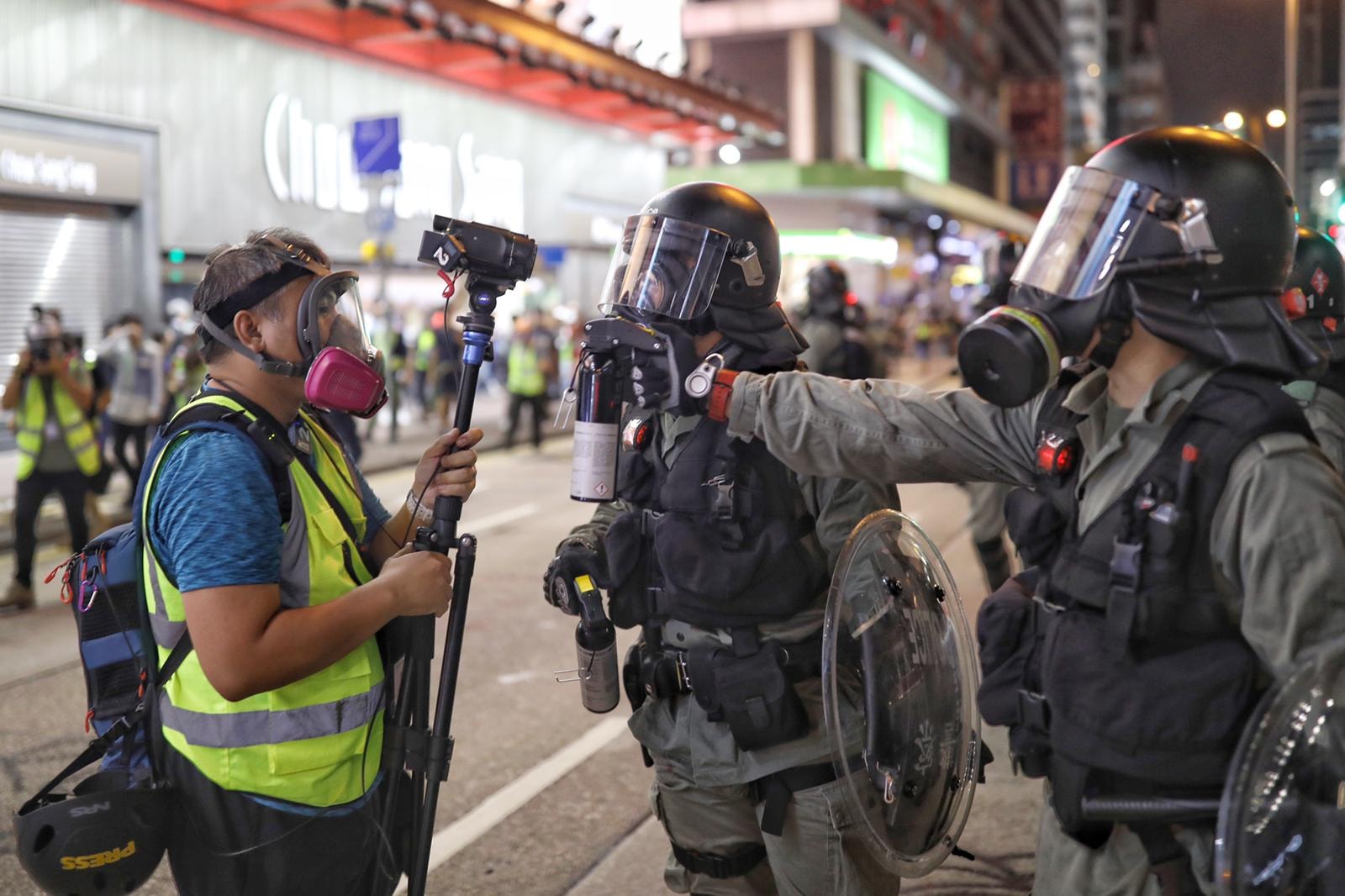
Ronson Chan covers the anti-government protests in 2019. Photo courtesy of Ronson Chan.
Ronson Chan, Stand News – October 1, 2020
Every year on China’s National Day, Hong Kong’s activists and citizens hold public demonstrations. As was the case on July 1, however, 2020’s march was banned by police. They cited public health concerns—large gatherings were to be avoided due to the coronavirus pandemic—and also claimed to be warding off the disruptions and violence of previous protests. Still, some people came out on the streets in defiance of the ban.
It was about a week after the police had announced the new accreditation policy. Ronson Chan, an editor at Stand News, noticed that there were fewer student reporters and young citizen journalists than usual at the unsanctioned protest. The police cordons stretched across the streets “like spiderwebs,” Chan said. It was a recently devised strategy to corral large groups of protesters and bystanders—and journalists as well, even those who were clearly marked as press.
Chan tried to enter a multistory shopping mall in order to film from above, but an officer stopped him, pressing on his shoulder—the first time he’d been physically restrained. Later, he saw dozens of people being rounded up, searched, and arrested on suspicion of taking part in an unauthorized assembly, including some who looked to be carrying groceries or merely passing by. Chan tried to approach the scene, but police kept him out of earshot, nearly eighty meters away.
‘Witnessing history has consequences. There might be punishment, injury, persecution. So are you still going to persevere?’
Being on the ground is important for Chan, thirty-nine. He grew up in Hong Kong in the 1980s, and recalled watching news of South Korea’s student protests and seeing Beijing’s military crackdown on the Tiananmen Square demonstrations on television. Seeking to understand what had happened, he began to read up on Chinese history. But he found many history books to be one-sided, aligned with either the Chinese Communist Party or the Kuomintang.
“I innocently thought at the time, if I were there at the scene, then I’d be able to know the facts, who was right and who was wrong,” Chan said.
In recent years, Chan has become known as “Brother Sing,” after the last character of his Cantonese name. He is a fixture at protest sites, relentlessly covering clashes and police actions via livestream for Stand News. Officers have pepper-sprayed him at close range, including directly in the eyes. Last winter, during a stop-and-frisk, a policeman placed Chan’s identity card in front of his camera for nearly forty seconds, his personal details in full view. (Doxing journalists is a common harassment technique employed by government supporters; police officers had also been doxed by protesters.)
The toll the work exacted on him was as psychological as it was physical. During the 2019 unrest, Chan documented one of the most violent clashes, at Hong Kong Polytechnic University—protesters blocked major roads and occupied the school; in response, police laid siege to the campus by sealing the exits and launching tear gas and sponge grenades. As he watched Red Cross medics rush onto the campus with stretchers prepared for injured protesters, Chan held on to a fellow journalist and broke down in tears. His city was unrecognizable; a neighborhood he visited often as a child had transformed into a battle zone.
“The tougher times get, the more they test our perseverance,” he says. “I’d made up my mind at the age of eight to get a front-row seat to history here. Now, witnessing history has consequences. There might be punishment, injury, persecution. So are you still going to persevere? This is a good time to examine myself.”
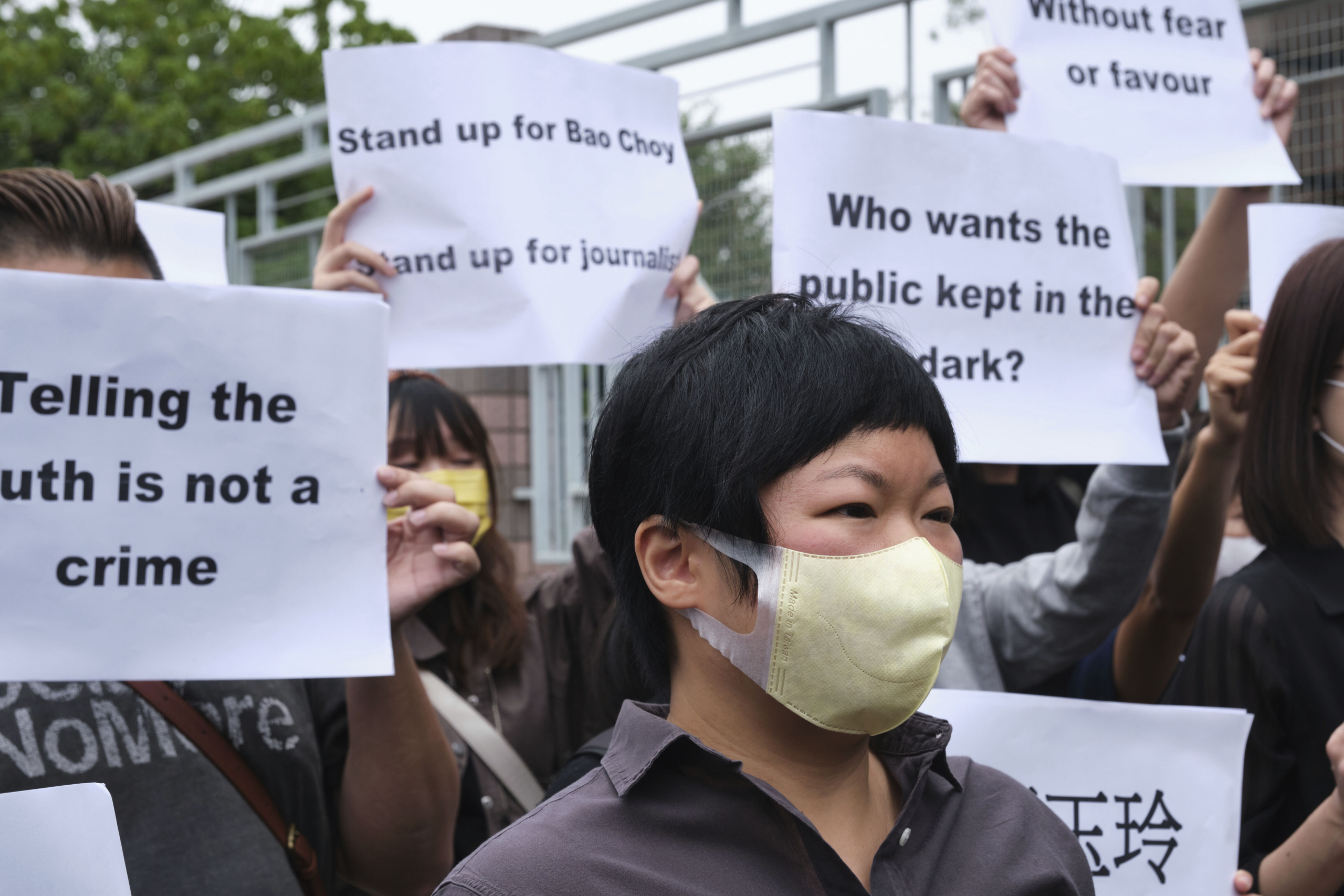
Bao Choy arrives to a November 2020 court appearance. Photo credit: Isaac Wong / Sipa via AP Images
Bao Choy, RTHK – November 3, 2020
Plainclothes officers led Bao Choy, a freelance documentary producer for RTHK, through a sea of video cameras and shutter clicks outside her home, in the Mei Foo neighborhood of Hong Kong. As they passed, reporters yelled, “Why are you arresting her?” That day, the header photo on Choy’s Facebook page read, “The free press is a cornerstone of democracy.” Her unexpected arrest would be another test of this freedom.
Choy, thirty-seven, was part of an acclaimed team at RTHK that had investigated the police’s slow response to the July 2019 mob attack. The assault took place in Yuen Long, the town where Choy grew up, inside the train station she frequented. Her team’s report reconstructed the timeline of the attack and police deployment, raising questions about why officers appeared to have ignored emergency calls and arrived late to the scene. According to the police, some of the men they eventually arrested had alleged ties to triad gangs. The team ran a follow-up investigation a year later, in July 2020, trying to trace some of the suspected assailants through CCTV footage. As per standard practice, Choy looked up the license plate numbers of the vehicles captured on CCTV in a city database.
For accessing that public database, Choy has been charged with violating traffic laws. Her trial is scheduled for late March. If convicted, she faces fines and up to six months in jail. The prosecution of Choy shook the industry—news and investigative reporters routinely perform searches of public databases. Press freedom advocates decried the charges as punishing a journalist simply for doing her job.
“I did what I believe a journalist should do,” Choy says. “Of course the legal proceedings have troubled me and created many unknowns about my future. But my conscience is clear, so I will face this calmly.”
In high school, Choy was once moved to tears while watching a TV show about Fermi Wong, a social worker and anti-racist activist. The show piqued her interest in journalism—giving her what she calls a “beautified” view of its powers. As a teenager she regularly watched Hong Kong Connection. Little did she know she would one day work for that very program, win honors for covering her hometown, and then go to trial for it.
Choy took her first job in journalism, at RTHK, in 2007. Less than a year later, she traveled to Sichuan Province to report on shoddy construction that led to mass casualties in the 2008 earthquake. It was a different climate: Hong Kong journalists could report freely in China, while in the mainland media deviations from the official narrative were unlikely to get through the censors. When Chinese citizens saw reporters from Hong Kong, “even under hopeless and heartbroken circumstances,” Choy says, “they hoped we could make their voices heard.”
At RTHK, Choy started to gravitate toward investigative journalism. By now she has worked there for a total of eleven years. Nevertheless, RTHK took her off Hong Kong Connection in November, after her arrest, a move criticized by the broadcaster’s staff union as “a sentence without a trial.”
Still, Choy says, she has no intention of quitting journalism. As she readjusts to an unstable schedule of freelance work, she hopes to devote at least half of her time to investigations.
Catherine Chan, i-Cable – December 1, 2020
In i-Cable’s newsroom, under the bright glow of mounted television screens, a noisy crowd was forming in front of a row of glass-paneled executive offices. Forty members of the editorial staff, including i-Cable’s award-winning investigative team, had just been abruptly fired, and the journalists were demanding answers. New leadership at i-Cable, a major twenty-four-hour news channel, had been installed a few months prior. The layoffs were a cost-cutting measure, the managers said. This explanation didn’t satisfy the journalists; they demanded to know how the list of forty names had been decided. In response, one of the directors, Anderson Chan, accused his staff of “bargaining like thugs.” By the end of the day, journalists across the company resigned en masse. The China bureau collectively stepped down, posting a message on Facebook pledging to “hold our ground and do our best work in the remaining days.” One by one, journalists on the Hong Kong desk also decided to quit. The walkouts were a remarkable show of solidarity—and an indication of a precarious future.
“When we talk about press freedom, we talk about whether there is censorship and so on. But I think the other scariest thing is about tampering with your resources,” Catherine Chan, thirty-five, says. Chan resigned from i-Cable along with others on the Hong Kong desk. It wasn’t a hard decision: staying on without “the good people” felt pointless. “Laying off our capable staff or drastically cutting our manpower is another way to affect the quality of our news,” she says.
i-Cable’s new leadership had arrived on August 10, the same day Apple Daily was raided. The company’s executive director, a veteran journalist who had cofounded its news division, stepped down, and a new team with dubious journalistic credentials took the helm. Anderson Chan, a former television presenter, had once incorrectly reported the death of former Chinese leader Jiang Zemin—an infamous episode. Another manager, Oscar Lee, attracted widespread scorn last year for what was seen as a softball interview with Hong Kong’s top police official. (“Have you taken any holidays since your promotion?” went one question.) A recently leaked video showed even Lam, the Beijing-appointed leader, appearing to mock Lee for what she called his “mild” questions.
Lui, the journalism lecturer at Hong Kong Baptist University, saw the management shake-ups at i-Cable as an impatient move by Beijing indirectly to wield control over Hong Kong’s independent media. “Beijing has always prioritized ideological safety, and it has become of extreme importance after Xi Jinping came to power,” Lui says.
Throughout the fall, i-Cable’s journalists were left feeling that the company no longer rewarded competence and hard work. The managers had announced sporadic furloughs and smaller layoffs. There were whispers about self-censorship. This latest round of layoffs, though, was a definitive sign that i-Cable was no longer the news channel they knew and loved.
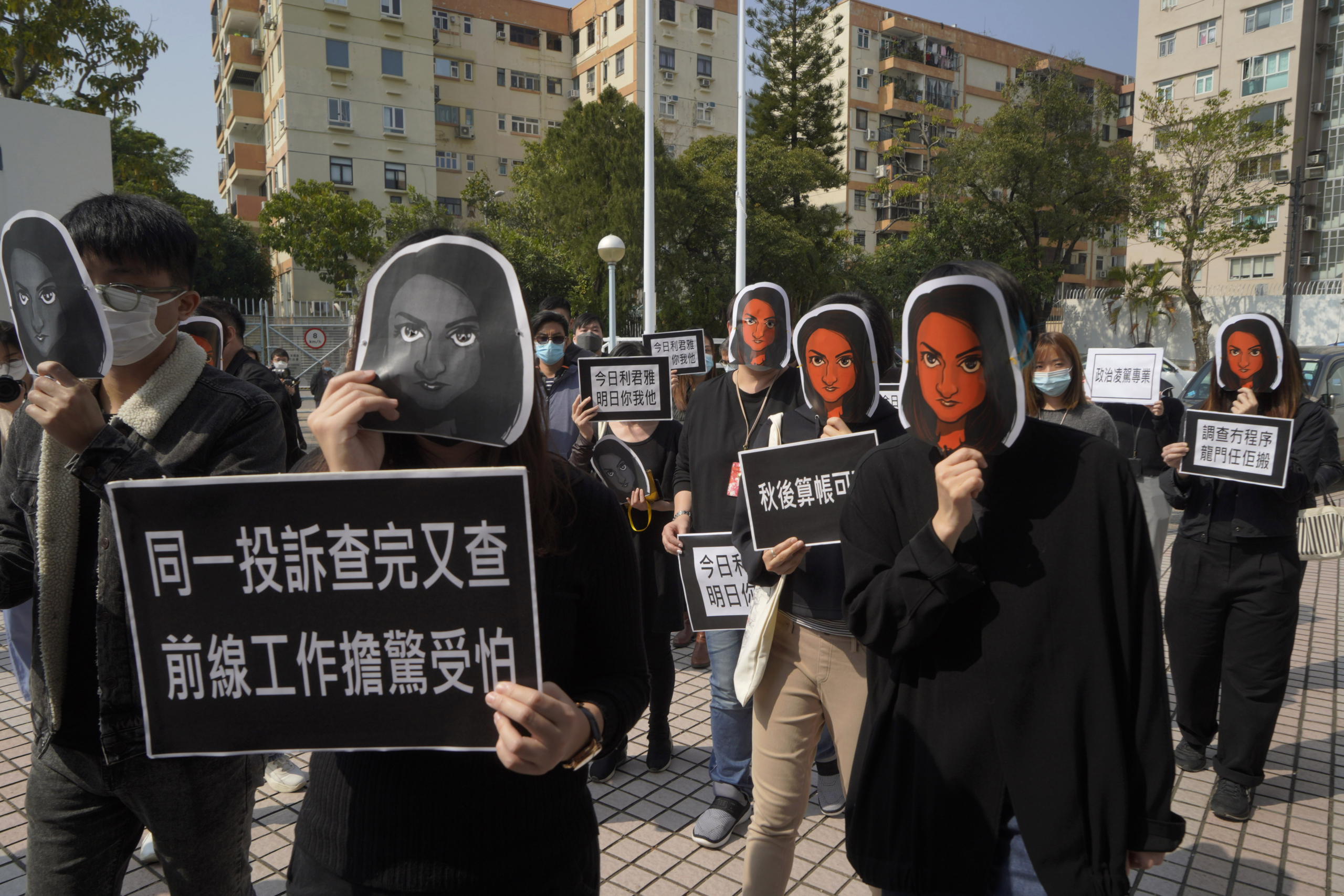
RTHK staffers protest disciplinary action against Nabela Qoser in January 2021. The placards read: “Reopen the investigation on complaints repeatedly, front-line journalists work in fear.” Photo credt: Kin Cheung/AP Photo
RTHK – February 19, 2021
Over the decades, RTHK, despite its government funding, built a reputation for independent and critical reporting, earning public trust. A 2019 survey by the Chinese University of Hong Kong found RTHK to be among the city’s most credible outlets. But for the past year that independence has been wearing away. Last spring, under pressure from authorities, the company suspended a long-running satirical program that parodied the police, and the government rebuked one of RTHK’s news programs for questioning a WHO official about Taiwan’s response to covid-19. In February, the company took the BBC World Service off the air, a move in lockstep with a ban on BBC programs from Beijing—even though Hong Kong is not under the control of Chinese government censors.
On February 19, RTHK’s future seemed sealed: Patrick Li, a senior government official with no background in journalism, was appointed as the new director. The same day, the Hong Kong government released a lengthy report to conclude a monthslong review it had conducted into governance of the broadcaster. The report accused RTHK journalists of failing to properly document their editorial decisions and recommended stronger supervision over “contentious” or “sensitive” content. It also suggested closer partnership with the company’s board of advisers, headed by a pro-Beijing politician.
Gladys Chiu, the chairwoman of RTHK’s staff union, said the moves could turn the broadcaster into a government mouthpiece. “RTHK, under the command of the government, serves citizens, not officials,” she told reporters. “It seems they want to replace our spirit of professionalism with bureaucracy. We find this very worrying.”
Even without an open crackdown on editorial independence, though, many journalists in Hong Kong fear a quiet reining-in of the media. Some observers have suggested that i-Cable’s controversial restructuring took place under the guise of commercial reasons, but could directly affect editorial operations. (The chairman and vice chairman of i-Cable’s board of directors are David Chiu and Henry Cheng, pro-Beijing real estate moguls.) Publications trying to survive a difficult news economy are slashing resources, and some disheartened journalists, already demoralized by low pay and long hours, are looking for an exit.
Ironically, the departing team’s experience working in mainland China had prepared them for their next chapter in Hong Kong.
Selina Cheng, a freelance investigative journalist, says that loss of talent due to unattractive conditions is nothing new for the industry, but that it’s now in a uniquely vulnerable state: populated with senior executives who have survived by playing by the rules, and a junior staff with little choice but to follow orders. “Midcareer reporters leaving the industry is another blow to Hong Kong’s press freedom and the quality of its press, because they bring with them the sources, the skills, and the experiences,” she says.
Among those who stay, a climate of self-censorship has taken hold. A reporter at Ming Pao Weekly, who asked to remain anonymous for fear of reprisal, says she has “internalized the pressure” from her bosses. She recently decided against pitching a politically sensitive story that just a year ago she would have pursued.
“You could’ve spent 100 percent of your energy on a story, but now you spend 50 percent working on it and the other 50 dealing with pressure from the higher-ups,” she says. “This very much deviates from our principles of journalism.”
2021 and beyond
On New Year’s Eve, journalists from i-Cable’s China desk produced their final television segment before stepping down. Leaving the office, they were greeted and hugged by former colleagues who had come to show their support. Among them was Bruce Lui, who had been a reporter for the channel from 2005 to 2012.
The mood was calm, tinged with a mix of sadness and pride, as well as with conviction. Different generations of the team were present, as committed as they had been on their first day, Lui said, “like candles that keep burning and passing on the light, which made me see hope and warmth.” Ironically, he added, the departing team’s experience working in mainland China had prepared them for their next chapter in Hong Kong.
The friends presented Szeto Yuen, the head of the team, with a gift: a scroll on which was written a phrase Yuen had shared on Facebook in December. It read, in Chinese calligraphy: “I would rather be ashes than dust.”
Elaine Yu is a journalist based in Hong Kong. She has recently covered the region for the New York Times and Agence France-Presse. Her work has also been published by Dissent, NewYorker.com, Vox, The Intercept, and others.


